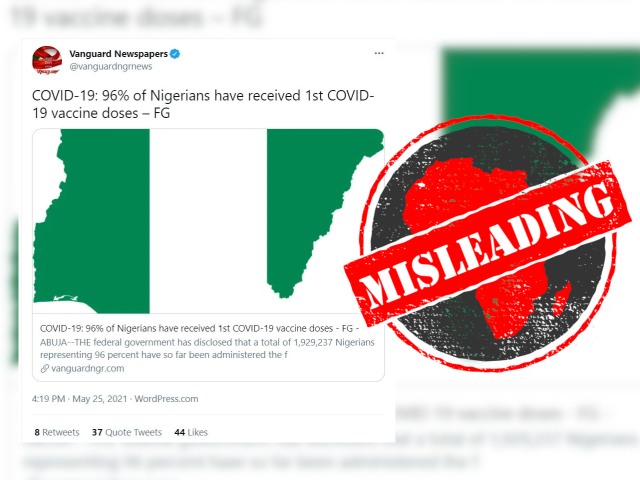Posts shared across social media in Nigeria, on Facebook and Twitter, mock the wife of a state governor for donating water to “empower” women.
Most of the posts show a photo of a crowd of people, many wearing face masks, standing beside bundles of what appear to be plastic sachets of water.
Some of the posts also show a photo of a woman making a speech at a podium, with two officials looking on behind her.
One post reads: “Wife of Bauchi state governor, Dr Aisha Bala Muhammed has empowered some women in the state with ten bags of pure water each.”
Another says: “Bauchi State First Lady empowers women with bags of sachet water to start business. Can you imagine this kind of empowerment?? Nigeria is Dead.”
Bauchi state is in northern Nigeria, southwest of Kano, the country’s second-largest city. The Bauchi governor is senator Abdulkadir Bala Mohammed.
Is it true his wife, Aisha Bala Mohammed, gave out water sachets to impoverished women? We checked.

Aisha Mohammed did distribute relief goods and entrepreneurial items at an internally displaced persons (IDP) camp on 12 June 2020 , as reported by the Vanguard newspaper. This was through her charity, Al-Muhibbah Foundation.
The foundation has carried out empowerment schemes for the past 14 years, according to the Daily Trust newspaper, since before her husband became governor of the state.
Vanguard reported that the items given out at the IDP camp had been specifically requested beforehand and “some people asked for sachet water to start up a water business”.
In a video shared on Facebook on 26 June, Mohammed said in Hausa that her foundation team “includes researchers and religious scholars and they give out aid to those who deserve it”.
“Anyone who thinks the water is not enough should donate water to see how useful it is to women starting a business,” she added.
The chief press secretary to the governor’s wife, Murjanatu Musa Maidawa, released a statement on Facebook, addressing the critical social media posts.
The statement reads: “Her Excellency ... trained 250 Women and Youths ... in various economic skills and empowered them with starter packages. These starter packs include Spaghetti making machines, flour, money and bags of Sachet Water.”
The statement also called out the media, saying they “mischievously ignored all the other items and single[d] out Bags of Sachet Water to … mislead the gullible and create unnecessary controversies”.
The foundation’s website says 250 women were “empowered” in the “Gwana District of Alkaleri Lga” and listed the donations: “50 spaghetti making machines and 1,000 bags of sachet water to support 50 pure water business owners. 150 small scale entrepreneurs received N5,000 each to support their businesses.” – Fatima Abubakar
Most of the posts show a photo of a crowd of people, many wearing face masks, standing beside bundles of what appear to be plastic sachets of water.
Some of the posts also show a photo of a woman making a speech at a podium, with two officials looking on behind her.
One post reads: “Wife of Bauchi state governor, Dr Aisha Bala Muhammed has empowered some women in the state with ten bags of pure water each.”
Another says: “Bauchi State First Lady empowers women with bags of sachet water to start business. Can you imagine this kind of empowerment?? Nigeria is Dead.”
Bauchi state is in northern Nigeria, southwest of Kano, the country’s second-largest city. The Bauchi governor is senator Abdulkadir Bala Mohammed.
Is it true his wife, Aisha Bala Mohammed, gave out water sachets to impoverished women? We checked.

‘Donations based on request’
Aisha Mohammed did distribute relief goods and entrepreneurial items at an internally displaced persons (IDP) camp on 12 June 2020 , as reported by the Vanguard newspaper. This was through her charity, Al-Muhibbah Foundation.
The foundation has carried out empowerment schemes for the past 14 years, according to the Daily Trust newspaper, since before her husband became governor of the state.
Vanguard reported that the items given out at the IDP camp had been specifically requested beforehand and “some people asked for sachet water to start up a water business”.
Response from Mohammed
In a video shared on Facebook on 26 June, Mohammed said in Hausa that her foundation team “includes researchers and religious scholars and they give out aid to those who deserve it”.
“Anyone who thinks the water is not enough should donate water to see how useful it is to women starting a business,” she added.
The chief press secretary to the governor’s wife, Murjanatu Musa Maidawa, released a statement on Facebook, addressing the critical social media posts.
The statement reads: “Her Excellency ... trained 250 Women and Youths ... in various economic skills and empowered them with starter packages. These starter packs include Spaghetti making machines, flour, money and bags of Sachet Water.”
The statement also called out the media, saying they “mischievously ignored all the other items and single[d] out Bags of Sachet Water to … mislead the gullible and create unnecessary controversies”.
The foundation’s website says 250 women were “empowered” in the “Gwana District of Alkaleri Lga” and listed the donations: “50 spaghetti making machines and 1,000 bags of sachet water to support 50 pure water business owners. 150 small scale entrepreneurs received N5,000 each to support their businesses.” – Fatima Abubakar
Republish our content for free
For publishers: what to do if your post is rated false
A fact-checker has rated your Facebook or Instagram post as “false”, “altered”, “partly false” or “missing context”. This could have serious consequences. What do you do?
Click on our guide for the steps you should follow.
Publishers guideAfrica Check teams up with Facebook
Africa Check is a partner in Meta's third-party fact-checking programme to help stop the spread of false information on social media.
The content we rate as “false” will be downgraded on Facebook and Instagram. This means fewer people will see it.
You can also help identify false information on Facebook. This guide explains how.





Add new comment